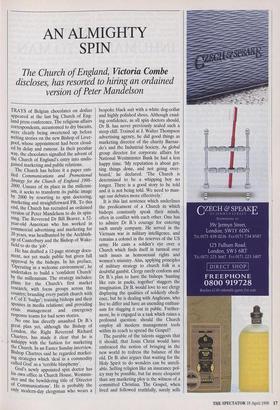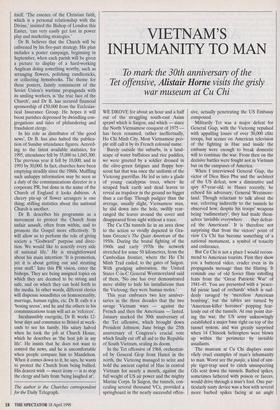AN ALMIGHTY SPIN
The Church of England, Victoria Combe
discloses, has resorted to hiring an ordained version of Peter Mandelson
TRAYS of Belgian chocolates on doilies appeared at the last big Church of Eng- land press conference. The religious affairs Correspondents, accustomed to dry biscuits, were clearly being sweetened up before writing stories on the new Bishop of Liver- pool, whose appointment had been cloud- ed by delay and rumour. In their peculiar way, the chocolates signalled the advent of the Church of England's entry into undis- guised marketing and public relations. The Church has before it a paper enti- tled Communications and Promotional Strategy for the Church of England 1998- 2000. Unsure of its place in the millenni- um, it seeks to transform its public image by 2000 by resorting to spin doctoring, marketing and straightforward PR. To this end, the Church has recruited an ordained version of Peter Mandelson to do its spin- ning. The Reverend Dr Bill Beaver, a 52- year-old American who has worked in Commercial advertising and marketing for 20 years, was headhunted by the Archbish- OP of Canterbury and the Bishop of Wake- field to do the 'job'. He has drafted a 12-page strategy docu- ment, not yet made public but given full aPProval by the bishops. In his preface, Operating in a welcome environment', he undertakes to build a 'confident Church' by the millennium. The strategy includes: Plans for the Church's first market research, with focus groups across the country; branding every parish church with a C of E `badge'; training bishops and their spouses in media relations; and providing crisis management and emergency response teams for bad news stories.
No one has directly assaulted Dr B.'s great plan yet, although the Bishop of London, the Right Reverend Richard Chartres, has made it clear that he is linhAppy with the fashion for marketing the Church. In an Easter Sunday interview, Bishop Chartres said he regarded market- ing strategies which 'deal in a commodity called God' as a 'terrible blasphemy'. God's newly appointed spin doctor has his own office in Church House, Westmin- ster and the bewildering title of 'Director of Communications'. He is probably the only modern-day clergyman who wears a bespoke black suit with a white dog-collar and highly polished shoes. Although exud- ing confidence, as all spin doctors should, Dr B. has never previously scaled such a steep cliff. Trained at J. Walter Thompson advertising agency, he did good things as marketing director of the charity Barnar- do's and the Industrial Society. As global group director for corporate affairs for National Westminster Bank he had a less happy time. 'My reputation is about get- ting things done, and not going over- board,' he declared. 'The Church is determined to be a whipping boy no longer. There is a good story to be told and it is not being told. We need to man- age our debates more effectively.'
It is this last sentence which underlines the predicament of a Church in which bishops constantly speak their minds, often in conflict with each other. One has to admire Dr B.'s courage for entering such unruly company. He served in the Vietnam war in military intelligence, and remains a colonel in the reserves of the US army. He casts a soldier's eye over a Church which finds itself in turmoil over such issues as homosexual rights and women's ministry. Alas, applying principles of military strategy to church folk is a doubtful gambit. Clergy rarely conform and Dr B.'s plan to have the bishops 'hunting like cats in packs, together' staggers the imagination. Dr B. would love to see clergy displaying the qualities of soldierly obedi- ence, but he is dealing with Anglicans, who live to differ and have an unending enthusi- asm for slugging it out in public. Further- more, he is engaged in a task which raises a profound question: should the Church employ all modern management tools within its reach to spread the Gospel?
The parable of the talents suggests that it should; that Jesus Christ would have embraced the notion of bringing in the new world to redress the balance of the old. Dr B. also argues that waiting for the Holy Spirit to do wonders can be unreli- able. Selling religion like an insurance pol- icy may be possible, but far more eloquent than any marketing ploy is the witness of a committed Christian. The Gospel, when lived and followed truthfully, surely sells itself. 'The essence of the Christian faith, which is a personal relationship with the Divine,' insisted the Bishop of London this Easter, 'can very easily get lost in power play and marketing strategies.'
Dr B. believes that the Church will be enlivened by his five-part strategy. His plan includes a poster campaign, beginning in September, when each parish will be given a picture to display of a hard-working Anglican doing something worthy, such as arranging flowers, polishing candlesticks, or collecting hymnbooks. The theme for these posters, faintly reminiscent of the Soviet Union's wartime propaganda with its smiling workers, is 'the true face of the Church', and Dr B. has secured financial sponsorship of £50,000 from the Ecclesias- tical Insurance Group. He hopes it will boost parishes depressed by dwindling con- gregations and tales of philandering and fraudulent clergy.
In his role as distributor of 'the good news', Dr B. has also halted the publica- tion of Sunday attendance figures. Accord- ing to the latest available statistics, for 1995, attendance fell by 35,000 to 1,045,300. The previous year it fell by 10,000, and in 1993 by 30,000. In fact, churches have been emptying steadily since the 1960s. Muffling such unhappy information may be seen as a duty of the communications director in a corporate PR, but done in the name of the Church of England it looks dubious. A cheery pin-up of flower arrangers is one thing; stifling statistics about the national Church is another.
Dr B. describes his programme as a movement to protect the Church from unfair assault, often from within, and to promote the Gospel more effectively. 'It will allow us to perform the role of giving society a "Godward" purpose and direc- tion. We would like to sanctify every side of national life.' He is straightforward about his main intention: 'It is promotion, yet it is about getting out and strutting your stuff.' Into this PR vision, enter the bishops. They are being assigned topics on which they are deemed to be strong and safe, and on which they can hold forth to the media. In other words, different clerics will dispense soundbites on homosexuality, marriage, human rights, etc. Dr B. calls it a `boxing arena', and he and the others in his communications team will act as 'referees'.
Inexhaustibly energetic, Dr B. works 12- hour days and commutes to Bristol at week- ends to see his family. His salary halved when he took the job at Church House, which he describes as 'the best job in my life'. He insists that he does not want to control the news, and he is uncomfortable when people compare him to Mandelson. When it comes down to it, he says, he wants to protect the Church from being bullied. His dearest wish — sweet irony — is to stop the clergy and laity from 'being laughed at'.
The author is the Churches correspondent for the Daily Telegraph,



























































 Previous page
Previous page